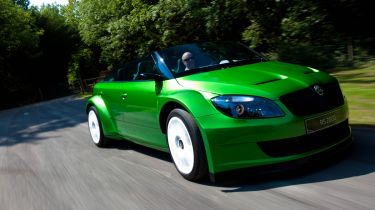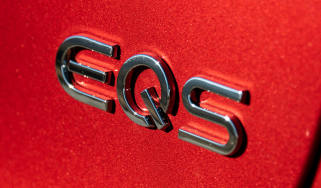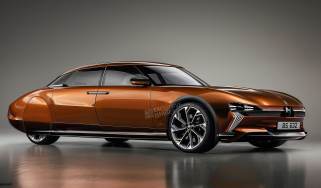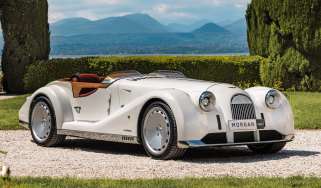Skoda vRS 2000 Concept
Sensational roofless rally car concept is a one-off – and we get behind the wheel to exclusively test it out
Building a fully street-legal roadster version of a rally car is pie-in-the-sky stuff, but the Skoda vRS 2000 Concept looks stunning and its performance potential is an added bonus. Although there’s no chance of the car entering production, it does show that Skoda is imaginative and willing to build cars that appeal to the heart as well as the head. And that can only bode well for its future hot hatches.
This Skoda is a convertible with a difference – a drop-top version of the company’s championship-winning Fabia S2000 rally car. Built for the Worthersee tuning show in Austria, the vRS 2000 Concept has leapt from stand to road – and now we’ve driven it.
It’s based on the Skoda Fabia S2000 Intercontinental Rally Challenge (IRC) car. Even though it’s designed for road use, it has the competition car’s 265bhp 2.0-litre four-cylinder engine and four-wheel drive. It also wears the stage star’s flared wheelarches, with vents to channel heat away from the brakes.
The rally look is completed by a deep front spoiler, aerodynamic splitter and 18-inch white alloy wheels. But look above the window line, and this car breaks with the norm. For a start, it has no roof. Plus, as there’s no need for soft-top storage space, the rear seats have been retained and the neat little bootlid features a pair of racy black speed humps.
Inside, the vRS 2000 will be slightly more familiar to drivers of the regular Fabia vRS. The dash controls and sat-nav screen come straight from the hot hatch. But the dash itself is coated with silver composite weave, and there’s a Union Jack inlay in tribute to Skoda UK’s backing of the 2010 IRC title success.
The front seats have been replaced by buckets, complete with five-point harnesses, while two individual seats take the place of the usual rear bench. The glass covers the cut-down B-pillars, giving the impression of pillarless windows while retaining strength. The low seats mean you still feel enveloped by the glass, even if it’s 5-10cm lower than a regular car’s.
The absence of a roof allows you to fully appreciate the rally-spec engine’s gloriously gruff exhaust note. Plus, the concept has great traction and feels much faster than the regular Fabia vRS. Rather than fitting a sequential racing gearbox, Skoda engineers have used the seven-speed DSG unit from the road car.
It changes quickly and smoothly, but the choice of manual and automatic modes is more in keeping with a car that was designed to attract attention rather than set fast special stage times. Despite the open top and noisy engine, the vRS concept feels refined up front. Rear seat passengers will get buffeted at high speeds, but that shouldn’t put them off the thrill of this car.



